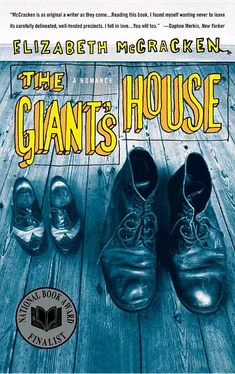I took a few steps. It seemed like a miracle, and I the heroine of a fairy tale. They fit. They were rigid and, truth be told, unflattering, but what did I have that needed so badly to be flattered? I walked around the front of the desk and wiggled my toes for him.
“Okay?” he said.
“I love them.”
“But do they fit ?” asked James, ever practical.
“Of course,” I said. “I couldn’t love anything that didn’t fit.”
“Aunt Caroline says I shouldn’t take advantage of the shoe store, but they told me I could have as many pairs of shoes as I want, just ask. I was going to get a pair for Mom, but I didn’t.”
I’d been admiring the shiny uncreased toes of my shoes. When I looked up at James, he was staring at my feet.
“Why not?”
“She only wears tennis shoes now, when she wears them at all. Mostly she just sleeps or stays on the sofa.”
At first I wasn’t sure I wanted to talk about Mrs. Sweatt. “How’s she feeling these days?”
“Um. The same, I think. Aunt Caroline thinks better, but I don’t. She doesn’t get out much. You should come see her.”
“Oh,” I said.
“Oh, well. I don’t blame you for not wanting to.”
“It’s not that. It’s just — well, maybe when she feels better.”
“Sure,” said James. He smiled at me. “Whenever that is.”
Though I loved my shoes (they are even now in their original box, worn once, immaculate), I did not love the fact of the shoe store. How was this different, I wondered, from Anna Swann in Barnum’s museum? In those days I still imagined James could have a career other than Acting Tall, that being inspected by the curious was fine on a volunteer basis (in the summer he could not help it) but was not a sensible profession.
“So,” I said to Caroline when she came to see me the next Monday. “James has a job.”
“He does?” she said. She took her spot at the front table; it was quiet, so I went to join her. “How wonderful.”
“You don’t know about the shoe store?”
“Oh, that ,” she said. “I never really thought of that as a job. He’s just going to be there twice a year, walk around.”
“And perhaps go to New York for them?”
“Yes,” she said. “He’s looking forward to that.”
“A lot of responsibility for a boy.”
“Good for him,” said Caroline. “And that way the shoes are free.”
“When I was a girl,” I said, “I didn’t have to work for my shoes—”
Caroline took my hand across the library table. “When you were a girl,” she said quietly, “you didn’t wear size thirty shoes. Peggy, if I could buy them for him, I would. But being that tall is an expensive proposition. I can’t tell you. It’s not like we’re rich people. I mean, we do our best, but shoes cost seventy-five dollars, and clothing as much or more. Mrs. Sweatt can’t do a thing for him. I mean, she does plenty for him, they talk, she loves him — well, that’s neither here nor there. If I could go to the shoe store, walk around for him, I would, I promise you.” She laughed, laid one hand on her stomach. “Goodness knows I feel like the biggest woman in the world, but they’re not offering free shoes to me .”
At home that night, I looked at my shoes and thought of Mrs. Sweatt, napping on her sofa in her sneakers. All I had wanted was to become part of that family. And not even an important part: a trusted maid, perhaps, a cousin several times removed. But Mrs. Sweatt stamped her foot, told her sister-in-law never to invite me back. I loved seeing Caroline and James at my library, but I was still being simply a librarian.
I was a fool. Foolish to imagine making myself part of a family that was not mine; foolish to think that people thought of me as anything but the librarian, a plain, no-nonsense, uninteresting person. Foolish to imagine myself some Hans Christian Andersen princess in those damn shoes, possessor of the only feet to inhabit the magic oxfords, especially since by the end of that day my feet — as if they might really have been momentarily bewitched into submission by the shoes — assumed their true size, and cursed at me bitterly for shutting them up in those leather dungeons.
A knock on the door usually meant my brokenhearted landlord. Gary was a quiet, plain man, and his excuses for coming to my door did not make much sense. In winter, he wanted to check my thermostat; for what he never said. In summer, he wondered if it was too hot, though of course there was nothing he could do about that. Even when I met him outside, on my way to work, he tested the air with his arm as if he had not been outdoors all along, and guessed at the temperature.
Nobody ever loved a woman more than Gary loved his wife, everybody said, and this might be so. People in town were amazed when he, who was heartbroken and not very handy, converted the attic of their house into the apartment I moved into.
“He’s getting over her,” Astoria told me, just after I’d moved to town and started work at the library. “Otherwise he never would have been able to do it.”
This proved not to be the case. Even my most casual conversation with him — at the house, at the library — was peppered with references to My wife, Cynthia. Finally I told him: I know her name now, you can just call her Cynthia. This seemed to both alarm and please him, as if I were laying claim simultaneously to his memories and the burden of them.
So when someone knocked on the door a few days later, I assumed it was him. It was winter and I didn’t know what sort of conversation he might make. Instead, it was Caroline.
Messy people might wish their apartments clean when unexpected guests arrive. I wanted mine messy so I could do something, glance around nervously, shuffle newspapers to make room on the couch. If, upon my death, someone decided to turn my apartment into a museum, as Caroline did years later with James’s cottage, they’d have to bring things in. History is all in how you display it, what’s preserved: this is the lesson of Pompeii. Better to use the library, string velvet bank ropes in front of the tall stool behind the circulation desk, fan out my typed catalog cards in glass cases, frame the form letters to the thoughtless people who kept books too long and the hopeful people who returned them late but never paid the fines. In my apartment even the toothbrush was shut in the medicine cabinet. It was a toothbrush anyone might have owned. Everything was in its place, exactly, and there was nothing to occupy my worried hands.
Caroline sat down slowly on the sofa; I sat next to her and straightened the fringed throw that our weight had disturbed.
“What is it?” I asked.
“Well,” Caroline said. Her bright lipstick hadn’t quite made its way into the corners of her mouth. “Missus is … she had an accident.”
“Oh, dear,” I said. “What happened?”
“That, of course, is the question. Something went wrong with her pills. She took too many of them, I guess.”
“On purpose?” I asked.
“Oh, maybe she forgot she’d taken it. We don’t know. She’d had a drink or two. No,” she said, suddenly sure. “Not on purpose.” Then she took a deep breath and told me this story:
Something had gone wrong with Mrs. Sweatt’s medication. That is, she took a quantity of sleeping pills — Caroline had been sure she’d thrown them all out — together with a quantity of vodka. In the middle of the night, as far as they could tell, she began to get sick and wandered — on purpose? thinking it was the bathroom? — into James’s room. For some reason he elected not to wake Caroline and Oscar but to help his mother get some fresh air. Together they stepped outside onto the front step, which because it was January was icy, and because it was two-thirty A.M. had not been sanded and salted by Oscar — Caroline explained that her husband was always careful about such things. James slipped and fractured his shin; Mrs. Sweatt tumbled into the bushes. By the time James had gotten into the house and woken his aunt and uncle, his mother was unconscious.
Читать дальше












